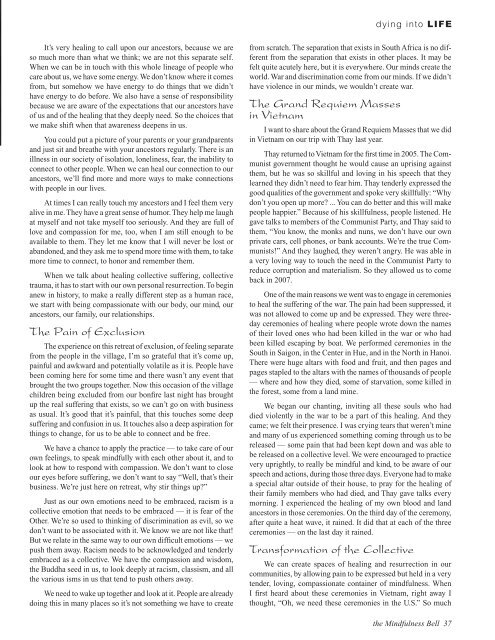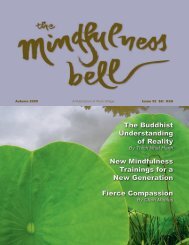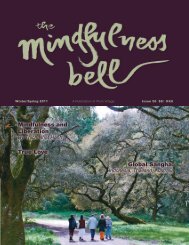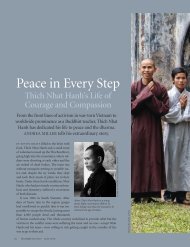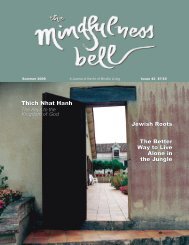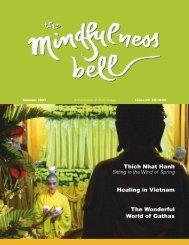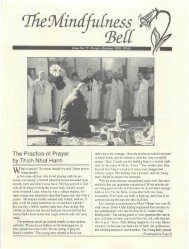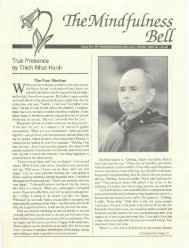Download - The Mindfulness Bell
Download - The Mindfulness Bell
Download - The Mindfulness Bell
You also want an ePaper? Increase the reach of your titles
YUMPU automatically turns print PDFs into web optimized ePapers that Google loves.
dying into LIFE<br />
It’s very healing to call upon our ancestors, because we are<br />
<br />
When we can be in touch with this whole lineage of people who<br />
care about us, we have some energy. We don’t know where it comes<br />
from, but somehow we have energy to do things that we didn’t<br />
have energy to do before. We also have a sense of responsibility<br />
because we are aware of the expectations that our ancestors have<br />
of us and of the healing that they deeply need. So the choices that<br />
we make shift when that awareness deepens in us.<br />
You could put a picture of your parents or your grandparents<br />
and just sit and breathe with your ancestors regularly. <strong>The</strong>re is an<br />
illness in our society of isolation, loneliness, fear, the inability to<br />
connect to other people. When we can heal our connection to our<br />
ancestors, we’ll find more and more ways to make connections<br />
with people in our lives.<br />
At times I can really touch my ancestors and I feel them very<br />
alive in me. <strong>The</strong>y have a great sense of humor. <strong>The</strong>y help me laugh<br />
at myself and not take myself too seriously. And they are full of<br />
love and compassion for me, too, when I am still enough to be<br />
available to them. <strong>The</strong>y let me know that I will never be lost or<br />
abandoned, and they ask me to spend more time with them, to take<br />
more time to connect, to honor and remember them.<br />
When we talk about healing collective suffering, collective<br />
trauma, it has to start with our own personal resurrection. To begin<br />
anew in history, to make a really different step as a human race,<br />
we start with being compassionate with our body, our mind, our<br />
ancestors, our family, our relationships.<br />
<strong>The</strong> Pain of Exclusion<br />
<strong>The</strong> experience on this retreat of exclusion, of feeling separate<br />
from the people in the village, I’m so grateful that it’s come up,<br />
painful and awkward and potentially volatile as it is. People have<br />
been coming here for some time and there wasn’t any event that<br />
brought the two groups together. Now this occasion of the village<br />
children being excluded from our bonfire last night has brought<br />
up the real suffering that exists, so we can’t go on with business<br />
as usual. It’s good that it’s painful, that this touches some deep<br />
suffering and confusion in us. It touches also a deep aspiration for<br />
things to change, for us to be able to connect and be free.<br />
We have a chance to apply the practice — to take care of our<br />
own feelings, to speak mindfully with each other about it, and to<br />
look at how to respond with compassion. We don’t want to close<br />
our eyes before suffering, we don’t want to say “Well, that’s their<br />
business. We’re just here on retreat, why stir things up”<br />
Just as our own emotions need to be embraced, racism is a<br />
collective emotion that needs to be embraced — it is fear of the<br />
Other. We’re so used to thinking of discrimination as evil, so we<br />
don’t want to be associated with it. We know we are not like that!<br />
But we relate in the same way to our own difficult emotions — we<br />
push them away. Racism needs to be acknowledged and tenderly<br />
embraced as a collective. We have the compassion and wisdom,<br />
the Buddha seed in us, to look deeply at racism, classism, and all<br />
the various isms in us that tend to push others away.<br />
We need to wake up together and look at it. People are already<br />
doing this in many places so it’s not something we have to create<br />
from scratch. <strong>The</strong> separation that exists in South Africa is no different<br />
from the separation that exists in other places. It may be<br />
felt quite acutely here, but it is everywhere. Our minds create the<br />
world. War and discrimination come from our minds. If we didn’t<br />
have violence in our minds, we wouldn’t create war.<br />
<strong>The</strong> Grand Requiem Masses<br />
in Vietnam<br />
I want to share about the Grand Requiem Masses that we did<br />
in Vietnam on our trip with Thay last year.<br />
Thay returned to Vietnam for the first time in 2005. <strong>The</strong> Communist<br />
government thought he would cause an uprising against<br />
them, but he was so skillful and loving in his speech that they<br />
learned they didn’t need to fear him. Thay tenderly expressed the<br />
good qualities of the government and spoke very skillfully: “Why<br />
don’t you open up more ... You can do better and this will make<br />
people happier.” Because of his skillfulness, people listened. He<br />
gave talks to members of the Communist Party, and Thay said to<br />
them, “You know, the monks and nuns, we don’t have our own<br />
private cars, cell phones, or bank accounts. We’re the true Communists!”<br />
And they laughed, they weren’t angry. He was able in<br />
a very loving way to touch the need in the Communist Party to<br />
reduce corruption and materialism. So they allowed us to come<br />
back in 2007.<br />
One of the main reasons we went was to engage in ceremonies<br />
to heal the suffering of the war. <strong>The</strong> pain had been suppressed, it<br />
was not allowed to come up and be expressed. <strong>The</strong>y were threeday<br />
ceremonies of healing where people wrote down the names<br />
of their loved ones who had been killed in the war or who had<br />
been killed escaping by boat. We performed ceremonies in the<br />
South in Saigon, in the Center in Hue, and in the North in Hanoi.<br />
<strong>The</strong>re were huge altars with food and fruit, and then pages and<br />
pages stapled to the altars with the names of thousands of people<br />
— where and how they died, some of starvation, some killed in<br />
the forest, some from a land mine.<br />
We began our chanting, inviting all these souls who had<br />
died violently in the war to be a part of this healing. And they<br />
<br />
and many of us experienced something coming through us to be<br />
released — some pain that had been kept down and was able to<br />
be released on a collective level. We were encouraged to practice<br />
very uprightly, to really be mindful and kind, to be aware of our<br />
speech and actions, during those three days. Everyone had to make<br />
a special altar outside of their house, to pray for the healing of<br />
their family members who had died, and Thay gave talks every<br />
morning. I experienced the healing of my own blood and land<br />
ancestors in those ceremonies. On the third day of the ceremony,<br />
after quite a heat wave, it rained. It did that at each of the three<br />
ceremonies — on the last day it rained.<br />
Transformation of the Collective<br />
We can create spaces of healing and resurrection in our<br />
communities, by allowing pain to be expressed but held in a very<br />
tender, loving, compassionate container of mindfulness. When<br />
I first heard about these ceremonies in Vietnam, right away I<br />
thought, “Oh, we need these ceremonies in the U.S.” So much<br />
the <strong>Mindfulness</strong> <strong>Bell</strong> 37


